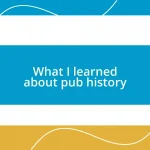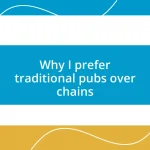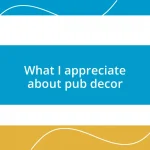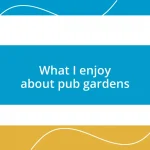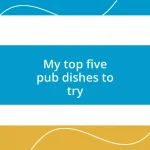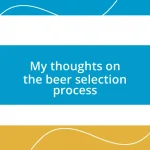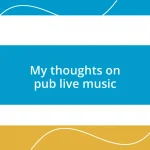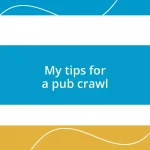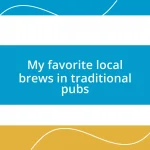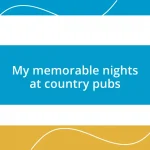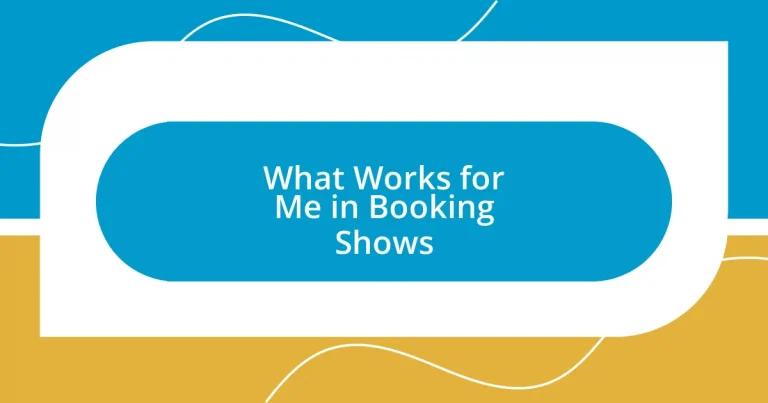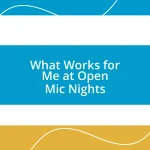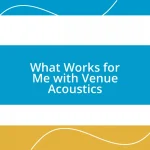Key takeaways:
- Organization is crucial in the booking process; breaking down tasks into manageable steps and creating timelines helps maintain focus and clarity.
- Defining clear, measurable show objectives and staying adaptable to changes can enhance audience engagement and ensure successful outcomes.
- Building relationships with venues, artists, and the audience is essential for fostering future collaborations and maximizing attendance through effective promotion.
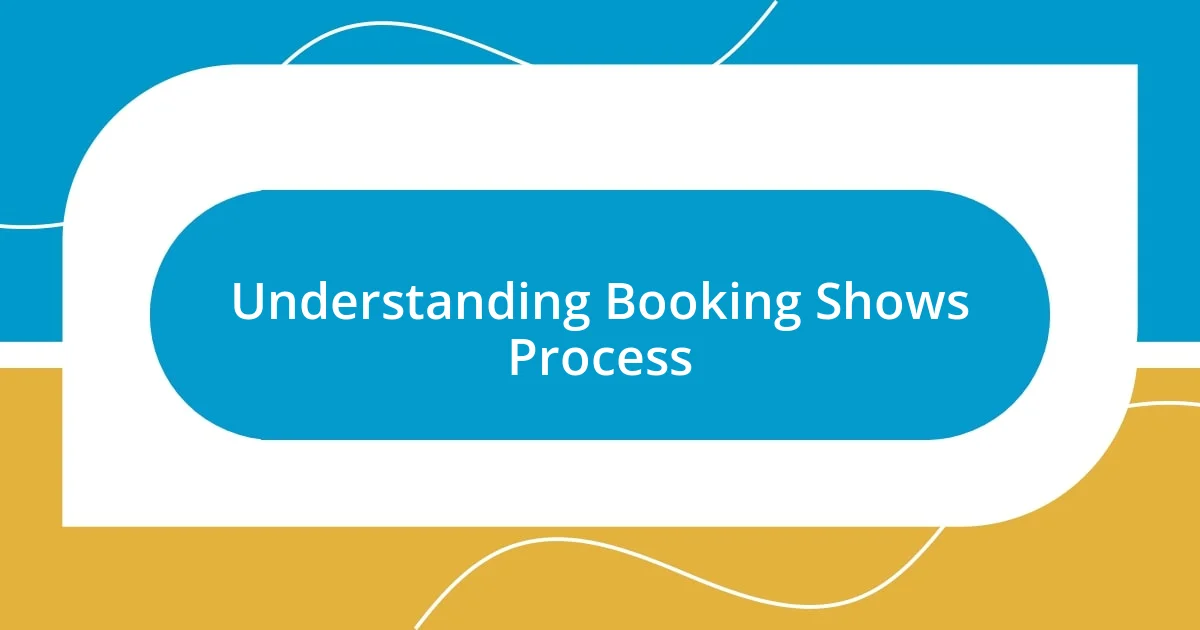
Understanding Booking Shows Process
Understanding the booking shows process is like navigating a labyrinth, filled with twists and turns that can either lead to a brilliant performance or a chaotic experience. I recall my first time booking a show—my nerves were palpable. I had to juggle venue availability, audience capacity, and budget constraints, all while trying to maintain clear communication with artists and their managers.
As I delved deeper into this process, it became clear that organization is key. I often found myself creating timelines and checklists to keep everything on track. Have you ever felt overwhelmed by too many details? I’ve learned that breaking down the booking process into manageable steps really helps. Whether it’s sorting out contracts or confirming sound checks, acknowledging each task can make a daunting process feel more achievable.
Another aspect that often gets overlooked is relationship building. I remember the importance of fostering positive connections with venue owners and other promoters. It’s not just about the current show; it’s about laying the groundwork for future collaborations. Isn’t it fascinating how a simple conversation can open doors? In my experience, taking the time to nurture these relationships can lead to more successful bookings down the line.
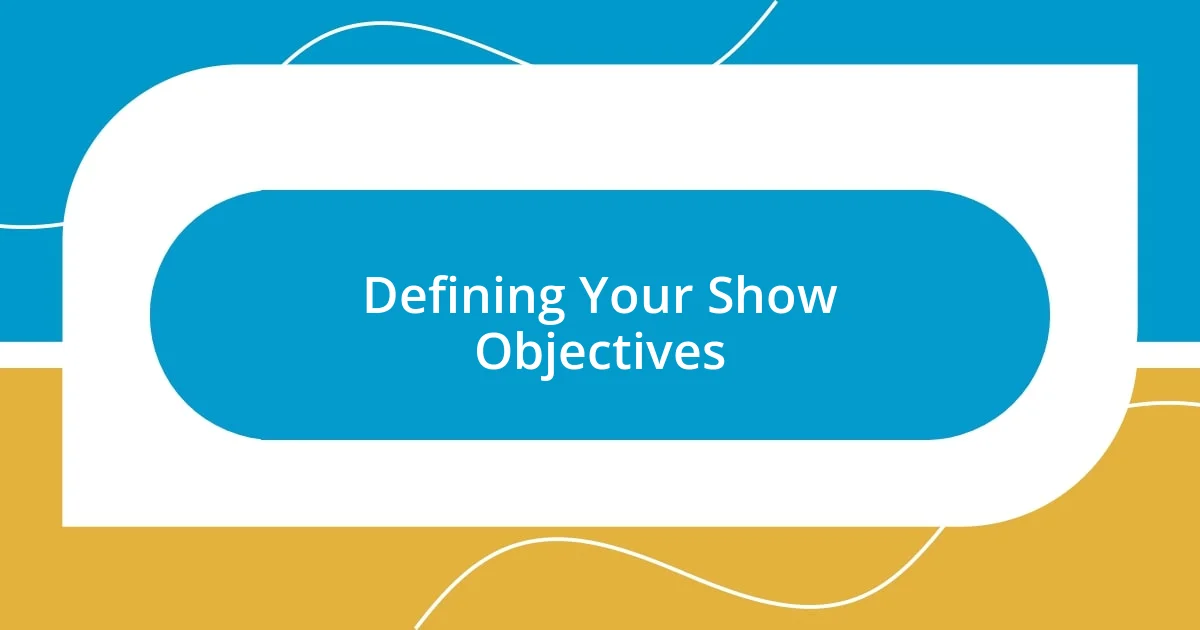
Defining Your Show Objectives
Defining your show objectives is a foundational step in the booking process. It’s not just about filling a venue; it’s about creating an experience that resonates. I remember one particular event where my objective was to raise awareness for a local charity. Instead of focusing solely on ticket sales, I prioritized audience engagement. The energy in the room felt electric, and the feedback I received reinforced the importance of aligning your show with clear, meaningful objectives.
I’ve also learned that objectives should be specific and measurable. For instance, aiming for a certain number of attendees or raising a specific amount of funds can guide your planning decisions. One of my earlier shows aimed to attract 200 people, so I adjusted my marketing strategy and reached out to local influencers. This focused approach enabled me to track our progress and ultimately hit our goal, which felt incredibly rewarding. Have you ever set clear goals and then celebrated when you achieved them? That sense of accomplishment can be a huge motivation booster.
Lastly, it’s crucial to remain flexible with your objectives. Sometimes, unexpected opportunities arise that can shift your focus. I once had a show that initially centered around local bands, but a last-minute opening allowed a well-known artist to join. This change led to a completely different objective— maximizing exposure and creating buzz. Embracing adaptability can make the difference between a good show and a sensational one.
| Objective Type | Description |
|---|---|
| Awareness | Focus on engaging the audience with your cause or message. |
| Revenue | Prioritize ticket sales and funding for future events. |
| Community Engagement | Foster local connections and relationships through the show. |
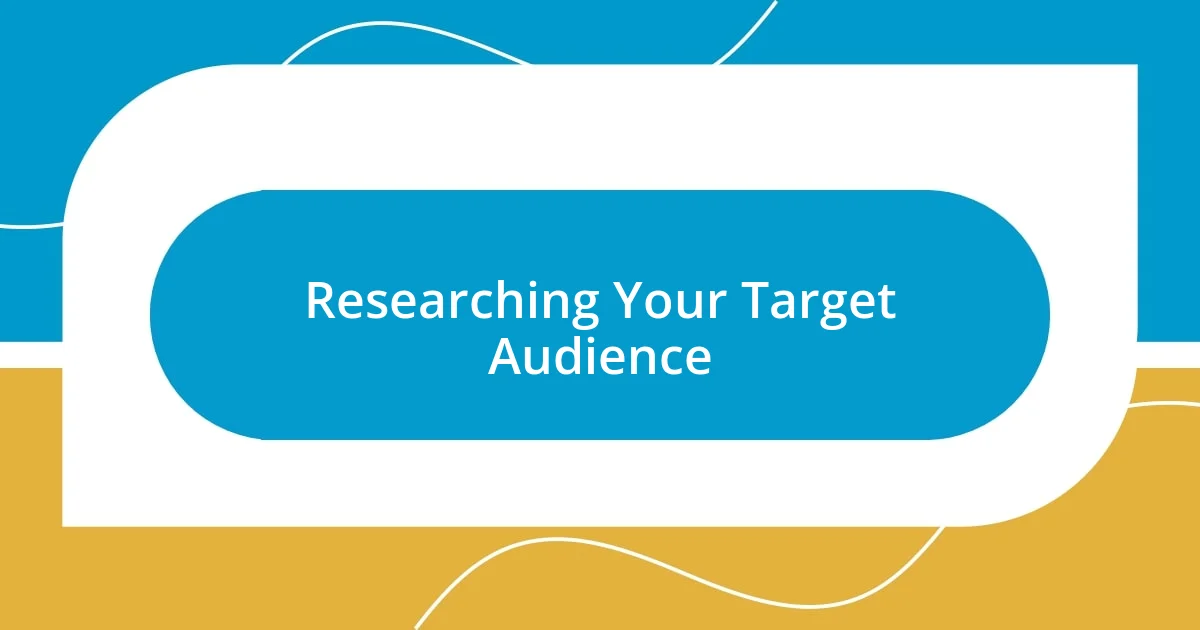
Researching Your Target Audience
Researching your target audience is essential in crafting a booking strategy that resonates. I often spend hours diving into demographics and psychographics, trying to gain a deeper understanding of who my audience really is. For me, it’s not just looking up statistics; it’s about connecting with potential attendees on a personal level. I remember visiting local events, just to observe the crowd—what they enjoyed, how they interacted, and what was missing that I could provide. These insights genuinely inform my bookings and make my marketing more effective.
When I take the time to dig deep, I usually create a profile of my ideal audience. Here are some aspects I consider:
- Demographics: Age, gender, income level, and education can greatly influence interests.
- Interests: Understanding hobbies or activities my target audience enjoys helps tailor the event experience.
- Location: Knowing where my audience hangs out guides my venue selection and marketing outreach.
- Feedback: Past shows’ surveys provide valuable insights into what went well and what could be improved.
- Social Media Activity: Analyzing which platforms they use helps direct my promotional efforts where they’ll be most effective.
By crafting a comprehensive audience profile, I align my shows with what attendees truly seek, which ultimately makes for a more enjoyable and engaging experience. When I remember that it’s about them, I feel more confident in my choices, and that confidence shows through in the success of the events.
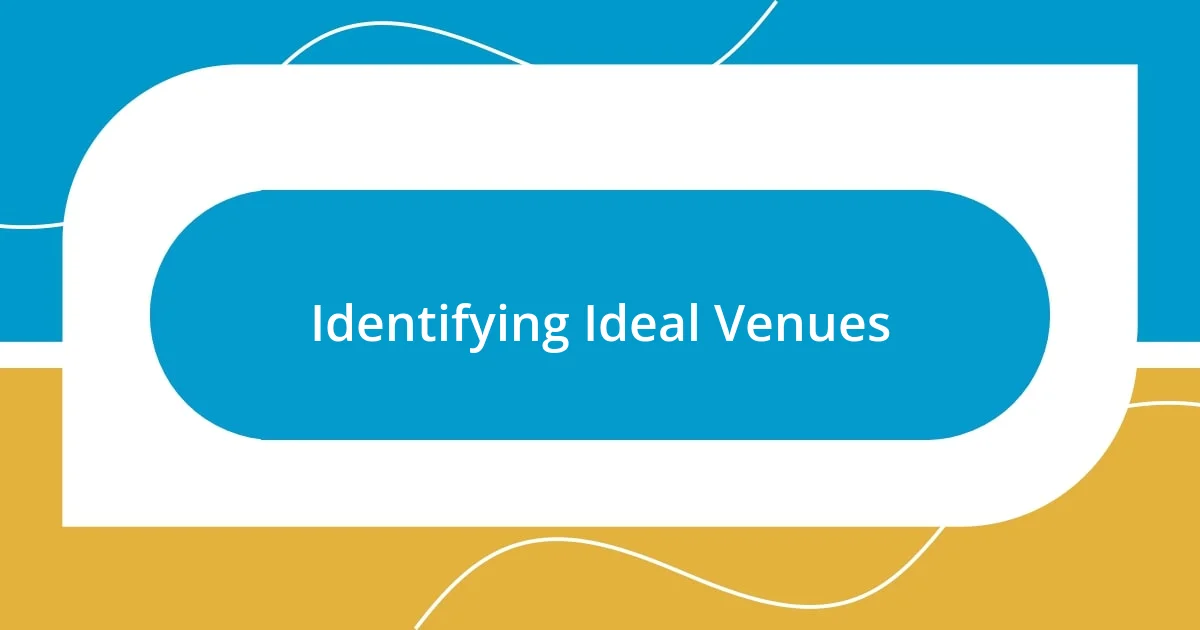
Identifying Ideal Venues
Identifying the perfect venue can feel like trying to find a needle in a haystack, but I’ve discovered a few key factors that make the process easier. First and foremost, the venue needs to vibe with your show’s theme. I once booked an indie band at a cozy coffee shop, which created an intimate atmosphere that really resonated with the audience. Do you think about the overall experience your venue can create? The right space can amplify the event’s energy and make it memorable.
Another crucial aspect is location. I’ve always chosen venues that are easily accessible, as I know convenience impacts attendance. For example, I once selected a venue a bit too far from the city center—a decision I regretted when very few people showed up. In my experience, a central location with good parking or public transport can significantly boost ticket sales. Have you considered how location might affect your audience’s willingness to attend?
Finally, I pay close attention to the venue’s capacity and layout. I remember one event where I overestimated interest and ended up with an oversized venue that felt empty and awkward. Conversely, a smaller space can create a lively, energetic atmosphere that draws attendees in. It’s all about balancing expectations and ensuring the venue complements your vision. I’ve learned that matching venue attributes with your goals helps me create the kind of atmosphere my audience truly enjoys. What features do you think your ideal venue should have?
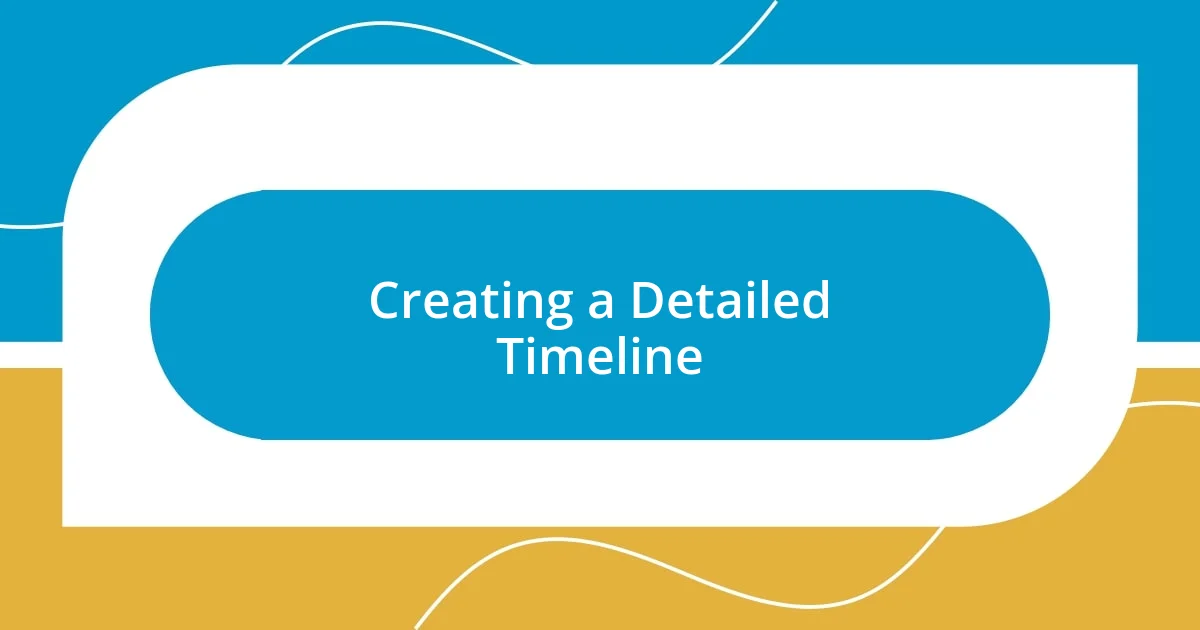
Creating a Detailed Timeline
Creating a detailed timeline is a game changer when it comes to booking shows. I’ve found that plotting out each step—from securing the venue to launching ticket sales—helps me stay organized and reduces the frantic energy that can creep in as the event date approaches. I typically break everything down into manageable tasks, and I always allocate extra time for unforeseen hiccups. After all, have you ever faced a last-minute glitch that threw your plans into disarray?
One memorable experience I had involved a last-minute lineup change just two weeks before a show. My detailed timeline allowed me to adjust without losing sleep. Because I had factored in time for marketing, technical rehearsals, and contingency plans, I could pivot smoothly and communicate effectively with everyone involved. It reminded me how vital it is to stay agile while remaining anchored to a structured plan.
I also embrace digital tools to create visual timelines. Platforms that let me see tasks, deadlines, and dependencies at a glance have made a significant difference in my workflow. For instance, using a project management app helped me visualize the process for a festival I organized last summer, making collaboration with my team seamless. Have you tried using technology to map out your plans? For me, the clearer the timeline, the less daunting the entire booking process becomes.
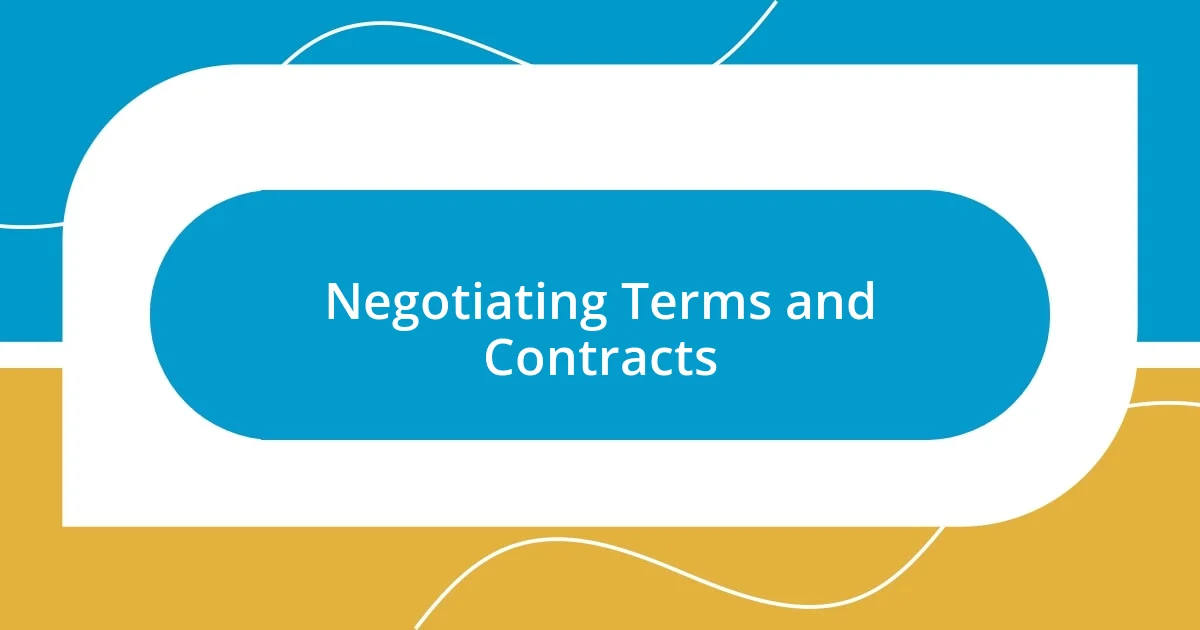
Negotiating Terms and Contracts
Negotiating terms and contracts can feel overwhelming, but it’s where the real magic happens. I remember the first time I negotiated a contract; I went in hoping for the best but ended up underselling my worth. It was a hard lesson, but it taught me to research industry standards and come in prepared with my own terms. Have you ever walked away from a negotiation feeling like you didn’t quite get what you deserved? Understanding your value can shift the entire conversation in your favor.
When it comes to specifics, I always ensure the contract covers essential items like payment structure, cancellation policies, and any additional fees. A few years ago, a gig didn’t go as planned, and I was grateful for a solid cancellation clause that protected my interests. I learned to never just skim through the fine print; every detail is crucial. Do you take the time to review contracts closely, or do you rush through the process?
I also find it helpful to keep communication open and transparent during negotiations. Once, I proposed a term that initially seemed out of reach, but by clearly explaining why it mattered, I was able to reach a compromise. Building rapport can help you navigate through potential roadblocks and ensure both parties leave feeling satisfied. Have you ever tried sharing your rationale in negotiations? I believe that understanding each other’s viewpoints can transform a simple contract into a collaborative agreement.
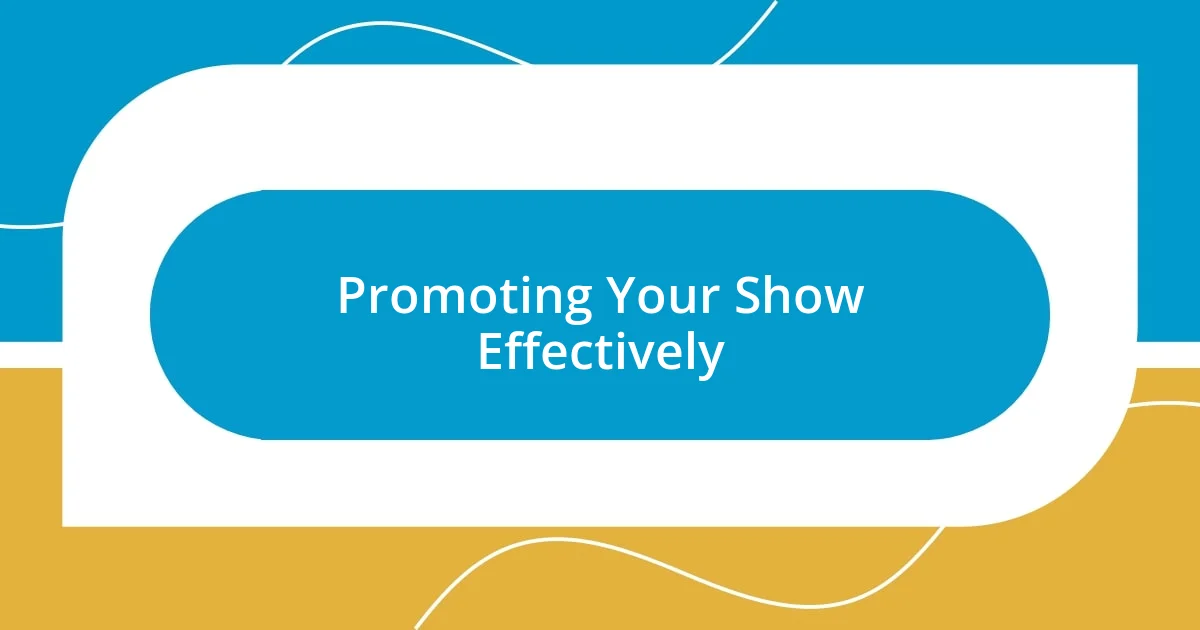
Promoting Your Show Effectively
Promoting your show effectively is crucial to its success, and I’ve learned that building a strong online presence is essential. Social media platforms are invaluable tools in my promotional toolbox. I typically create a content calendar, linking intriguing visuals with behind-the-scenes glimpses, which often leads to a buzz that amplifies interest. Have you noticed how a great teaser can spark conversations? I find that people are much more likely to engage when they feel a connection to the story behind the event.
In one instance, I launched a campaign for a show that aimed to highlight emerging local talent. I crafted engaging stories for each artist, sharing their journeys and aspirations. The feedback was incredible; on the night of the event, I was overwhelmed by the turnout! It reinforced my belief that connecting emotionally with your audience can significantly impact attendance. Plus, I always encourage my team to share promotional posts—after all, word-of-mouth is still one of the most powerful marketing tools.
I also prioritize crowd engagement before the event. By hosting live Q&A sessions or interactive polls on social media, I encourage potential attendees to become part of the show-building process. This approach fosters a sense of ownership and builds excitement. Did you ever attend an event where you felt personally invested in its success? That’s what I strive for; creating a community around my show transforms casual interest into enthusiastic participation.
